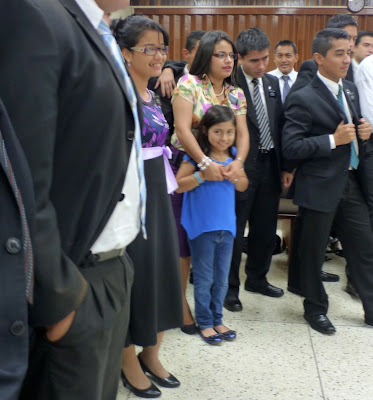As we discovered when the plane landed in Valencia, Venezuela, all the clocks are 30 minutes ahead. Sure enough, our friend Hugo Chavez, on Sunday, December 9, 2007, shoved the country even further out of touch with the rest of the world. "I don't care if they call me crazy, the new time will go ahead," he said. And they did. Call him crazy, I mean.
By the way, a brief lesson in pronunciation. It's "Hugo," as in "Ooooh! Go!!" as opposed to "Jugo," which is pronounced as if with an "H" at the beginning, and which means "juice," as in another crazy guy (see "Simpson, O.J."), or "Yugo" (see "Automobiles, Yugoslavian, Crummy").
Anyway, we had the opportunity to travel to the Venezuela Valencia Mission this week at the invitation of President Jorge Montoya and his kind wife. We were able to attend Zone Conferences in the cities of Valencia, Barquisimeto and Maracay, meeting with all 106 missionaries in the Mission. The Montoyas are quite young, from Quito, Ecuador, with three kids in tow.
I had the honor of giving of giving a brief presentation on several health subjects before taking off with an Assistant to the President to check out health clinics and hospitals while they continued with the conferences. I think this was when I was talking about dengue fever or rabies or diarrhea; that always crack them up down here.
I believe that 'spellbound' comes closest to describing the mood among many of the participants.
Once my scintillating presentation was through and I was gone to the clinics, the group had a great time learning new principles and doing group participation. The Montoyas' youngest, Valeria was off the day from school, bored, and came in a taxi after a while; she's the Mission Mascot.
President and Sister Montoya were an inspiration to me. They obviously love their missionaries, and lead by that principle; the missionaries do what they are supposed to out of love and respect, and not out of obligation. There was a great feeling in the groups.
As you'll notice from the picture below, we were the lone Gringos; North Americans are no longer able to serve there.
All visits have to end, so we packed up and headed back to Bogotá today, and (*surprise!*) were almost diverted to Cali because of strong thunderstorms over our fair but rainy city.
We hope that your watches are set on something other than Hugo Time.
Dave & Paula

















